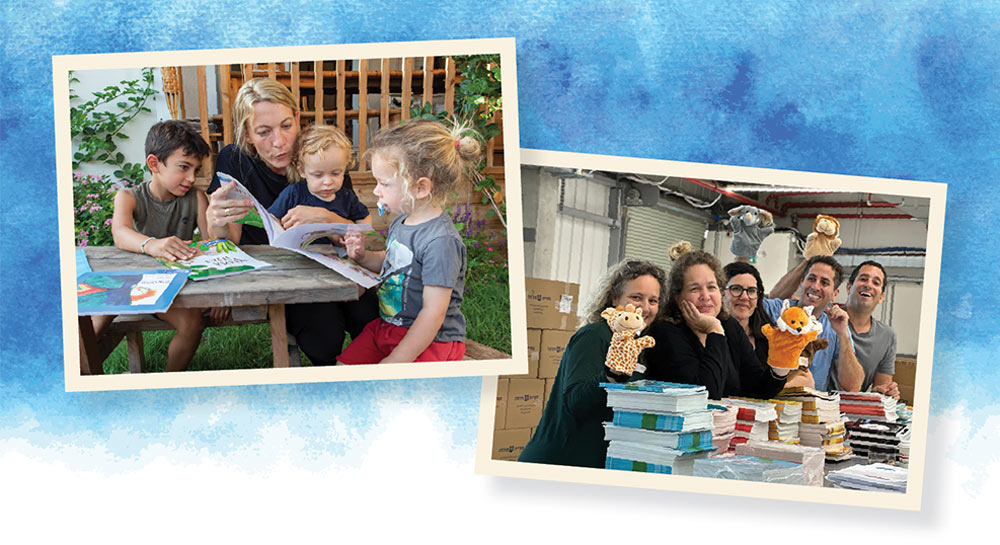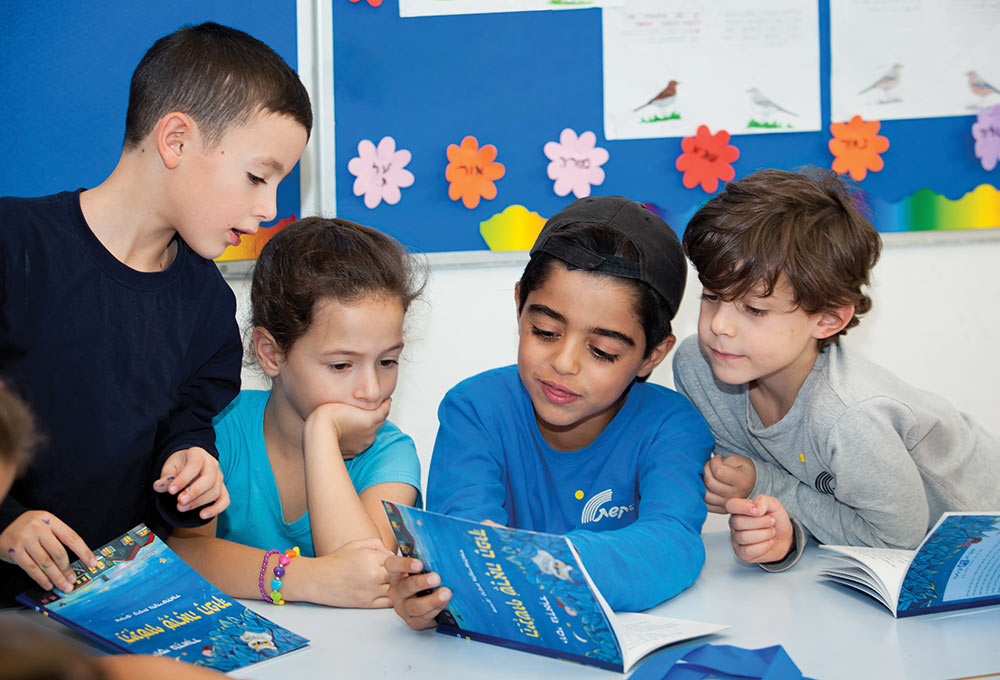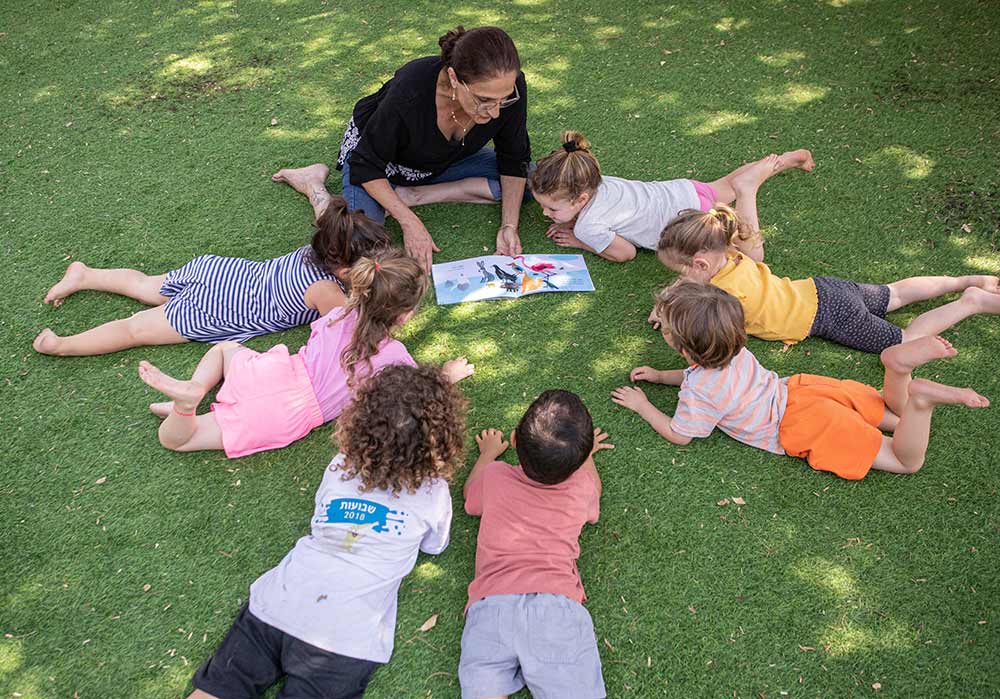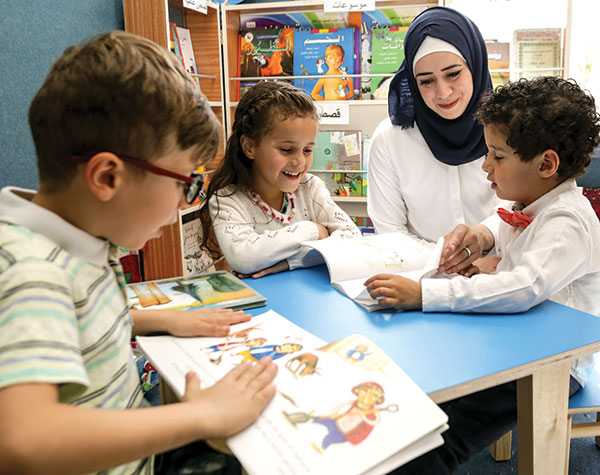Delivering for Israel’s Children
Under extraordinary circumstances, PJ Library in Israel pivoted to respond to families’ needs after October 7.
By Rachel Zaimont, Managing Editor
This story appeared in the summer 2024 issue of PROOF, a PJ Library magazine.

Keren Grinspoon Israelʼs staff stepped in to pack stories and activities for children last fall.
PHOTOS COURTESY OF KEREN GRINSPOON ISRAEL
Grief and tumult marked the first weeks after the October 7 attack in Israel. Families watched in horror as the news named hostages and relayed the death toll. Schools and businesses closed. More than a quarter of a million Israelis fled their homes for evacuee centers as rockets exploded over cities and towns. Educators and government officials scrambled to care for one of Israel’s most vulnerable populations: young children.
In the Dead Sea region, where seven displaced communities sought temporary refuge, Vivian Terkel-Gat helped establish kindergartens at hotels and other shelters for evacuees. Terkel-Gat, an early childhood coordinator with Israel’s Ministry of Education, strove to give children a much-needed sense of routine. But necessities, such as books and art supplies, were scarce.
Then a crucial gift arrived: hundreds of activity kits filled with children’s books, craft materials, ideas for games, and discussion prompts based on the stories. The kits bore a beloved logo — that of Sifriyat Pijama, PJ Library’s sister program in Israel.
“When the Sifriyat Pijama packages arrived in small, perfectly organized boxes, it was a glimmer of hope in the midst of despair,” Terkel-Gat recalls. “For the educators, these books were a lifeline that enabled them to continue teaching despite the challenging circumstances. The children were delighted as they received books that felt familiar, and the creative kits gave them an outlet for expression. It was heartwarming to see them engage with these resources, finding moments of joy and normalcy amid the chaos.”

In Israel, children receive books in class and take copies home.
PHOTO COURTESY OF KEREN GRINSPOON ISRAEL
Sifriyat Pijama (“Pajama Library”) is a household name for more than 350,000 Israeli Jewish children growing up on the brand’s vibrant Hebrew-language books. Just as recognizable is Maktabat al-Fanoos (“Lantern Library”), a companion program that brings culturally appropriate books in Arabic to 170,000 Israeli Arab children. Keren Grinspoon Israel (KGI), the Harold Grinspoon Foundation’s presence in Israel, oversees both programs in collaboration with the Israeli Ministry of Education.
Founded in 2009, KGI delivers monthly books to children ages 1-8 at school or in day care, where teachers incorporate the stories into their lessons before kids take their own copies home. But for a time, the war changed everything.
Marshaling its resources, partnerships, and donor support, KGI mounted an extraordinary emergency response for Sifriyat Pijama and Maktabat al-Fanoos families in the aftermath of the attack. With care and speed, KGI provided books, programming, and vital connection and comfort to families across Israel — wherever they were — in a time of tragedy.
“Our team responded to families’ needs with incredible strength and creativity under the most horrific circumstances,” says Andrea Arbel, executive director of KGI. Adds Inbal Tofach-Ben Hevron, director of Sifriyat Pijama, “We kept thinking, ‘What do families need? Where are they now? How can we help them?’”
“We kept thinking, ‘What do families need? Where are they now? How can we help them?’”
- Inbal Tofach-Ben Hevron
October 8 was supposed to be the first book-distribution day of the school year. Some 250,000 books sat on pallets, awaiting delivery to children in classrooms across Israel. “The warehouse was ready; the books were ready,” Arbel recalls. “Instead, on Shabbat [October 7], we woke up to a nightmare.”
News reports pieced together the scale of the attack, the terror and destruction. Thousands of children were displaced as entire communities evacuated to hotels and hostels. The Ministry of Education soon closed schools. Many families slept in bomb shelters. All struggled to process the attack against a backdrop of sirens, loss, and fear.
Yet amid the trauma, resilience blossomed. It dawned on Arbel and the rest of the team that not only was KGI needed in those dark days, but it was uniquely positioned to play a role as families navigated their new normal. Parents and children needed a respite — and curling up with a story could provide just that.
The team formed a plan. Working around the clock, they mined their archive of book-related activities, arts-and-crafts projects, and audio content and created new web pages — in Hebrew and Arabic — offering KGI’s vast trove of resources in an easily accessible format. The pages drew so much web traffic that KGI’s server temporarily crashed.
“When parents are under stress, the most important thing we can do is give them easy things to do at home,” Arbel says. “‘What’s an art project we can do?’ ‘What’s a conversation starter I can use to talk about emotions with my child?’ Parents look to us; our materials are approved by the Ministry of Education. Theyʼre easy, theyʼre there, and theyʼre good quality.”

Sifriyat Pijama shipped thousands of educational activity kits to children in evacuee centers.
PHOTO COURTESY OF KEREN GRINSPOON ISRAEL
The web pages were just the beginning. The Ministry of Education sent a list of requests: books for families in evacuee centers, audiobook recordings in Hebrew, and family programming in Arabic. The Sifriyat Pijama and Maktabat al-Fanoos teams got to work.
Over the months that followed, with emergency funds from the Harold Grinspoon Foundation and generous private donors (including readers of this magazine!), Sifriyat Pijama packed and shipped thousands of educational activity kits for teachers to share with children in evacuee centers across Israel.
In November, the team surprised kids in 400 centers with books and games. In December, they sent Hanukkah-themed packages; alongside familiar stories were supplies for children to make a DIY hanukkiah. The kits allowed displaced families — who left home without menorahs — to light candles with their children in their hotel rooms. “It created lots of light and togetherness,” Tofach-Ben Hevron says. “Teachers at these centers told us families were moved.”
Sifriyat Pijama next designed kits for Tu B’Shevat in January and sent its fourth kit shipment to children in April for Passover. Sifriyat Pijama coordinated with the Ministry of Education to keep track of families in flux.
“Sifriyat Pijama and Maktabat al-Fanoos provide books to the majority of children across the country; they are well-known and cherished brands,” says Merav Turgeman, Ph.D., director of pedagogical administration for preschool at the Ministry of Education. “When books and activity kits started arriving at hundreds of evacuee centers, it was as if a trusted friend arrived.”
The kits weren’t only beneficial for the children who received them. “When this war started, every citizen in Israel felt like they had to do something to help,” Tofach-Ben Hevron explains. “Packing these boxes was part of this feeling. We drew hearts on them and filled them with love and caring. It was something we could do for families in this situation.”
Sifriyat Pijama also recorded 20 new audiobooks. Already popular among young listeners, these Hebrew-language stories soothed children during the war. “We got many responses from families saying they listened to our stories while they were in their shelters,” Tofach-Ben Hevron says.

KGI distributes storybooks to Israelʼs Jewish and Arab children.
PHOTO COURTESY OF KEREN GRINSPOON ISRAEL
Maktabat al-Fanoos produced a special series of live virtual programs for families in Arabic-speaking communities in October.
Asma Zahalka, Maktabat al-Fanoos’s director, heard similar experiences from scores of Israeli Arab parents: Their children couldn’t go to sleep at night because of the war. “They spent many hours in the shelters. They didn’t go to school. And they felt their parents’ fear and stress,” she says.
In response, Zahalka and her team hosted a special story hour about relaxing before bed. Designed with a child psychologist and based on the book The Prince’s Bedtime — about a young prince who can’t sleep until someone reads him a story — the session was “a way to remind parents, ‘You have the tools,’” she says. “We don’t need many things; we just need this intimacy between the parent and child and quiet time around a book. Many parents were grateful for that reminder.” (Some 4,600 families tuned in.)
Other story hours featured art therapy and invited children to explore how they can persevere when their world is upside-down. The takeaway? It’s possible to overcome challenges; resilience is key. “It may be difficult now,” Zahalka emphasizes, “but it will not stay that way forever.”
Over the winter, schools in Israel reopened. With support from funders including the Max and Marian Farash Charitable Foundation, the Wiener Philanthropy, and Price Philanthropies, Sifriyat Pijama and Maktabat al-Fanoos resumed distributing books.
Israeli officials praise KGI’s efforts. “When war broke out in October, we knew we could count on KGI for help,” says Orna Paz, director of preschool at the Ministry of Education. “We knew the team could provide an array of quality resources in real time.”
KGI is already preparing to play a role as Israel charts its recovery. The war could have long-term impacts on children and families, so KGI is enlisting educational psychologists to help guide upcoming plans. Expertise in combating learning loss and building emotional resilience will be vital, Arbel says.
Whatever the future holds, the team knows one thing: Reading will be as important as ever in helping to empower children.
“If we can’t control the world around us, maybe we can at least control our own small place that we are in,” Zahalka says. “Children have the power to choose a book. When they read a familiar story, they can predict what is going to come next. That brings a sense of comfort. This is something we can do to give
children some strength — some hope.”
PJ Library is committed to a strong foundation and promising future for all of Israel’s children. Gifts to PJ Library in Israel provide crucial supplies to children who need them most. Give today to support a bright tomorrow. Visit pjlibrary.org/proofgift.